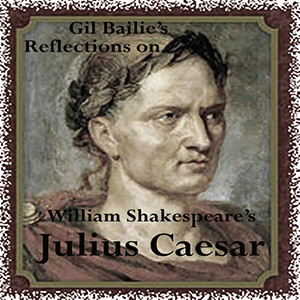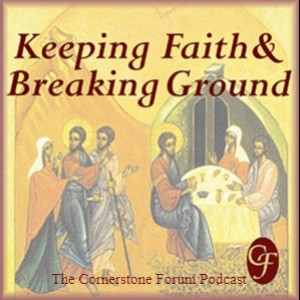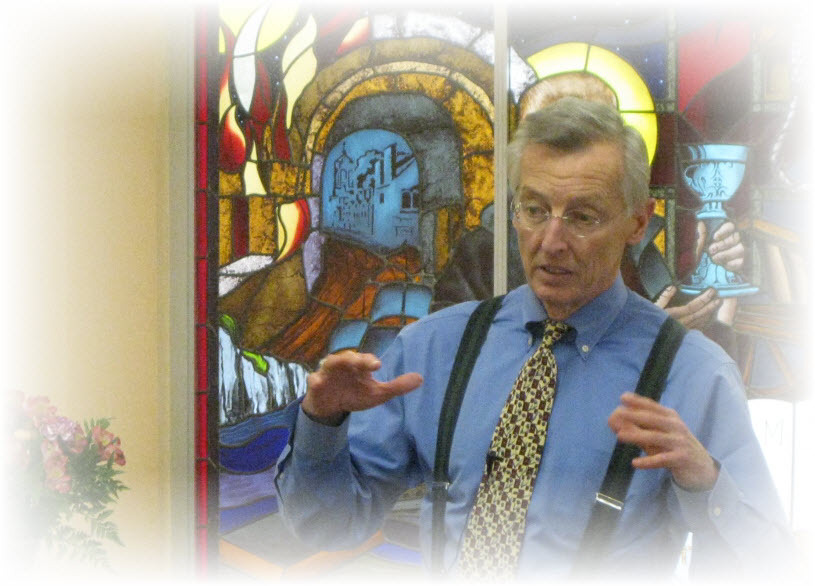Episodes

Saturday Dec 18, 2021
Saturday Dec 18, 2021
Gil Bailie examines William Shakespeare’s Julius Caesar through the lens of René Girard. Shakespeare’s play looks at the volatile transition from republican Rome to Imperial Rome. In Act 3 the conspirators assassinate Caesar and attempt to sacralize their deed – to turn the murder into a sacrifice. Brutus asks his co-conspirators to dip their arms in Caesar’s blood and shout ‘peace, freedom, liberty’, using gore to give a greater gravity to their sacred violence. But this trick fails as Antony gives voice to the wounds of fallen Caesar. When sacred violence is compromised by the voice of its victim it no longer can constrain mimetic passions and all hell breaks loose… “let slip the dogs of war”.

Friday Dec 17, 2021
Friday Dec 17, 2021
Gil Bailie examines William Shakespeare’s Julius Caesar through the lens of René Girard. Shakespeare’s play looks at the volatile transition from republican Rome to Imperial Rome. Act 2 begins with Brutus’ self-seduction into the conspiracy to kill Caesar. “Therefore it is meet that noble minds keep ever with their likes, for who so firm that cannot be seduced?”

Thursday Dec 16, 2021
Thursday Dec 16, 2021
Gil Bailie examines William Shakespeare’s Julius Caesar through the lens of René Girard. Shakespeare’s play looks at the volatile transition from republican Rome to Imperial Rome. One of the chief protagonists of the drama is the ‘crowd’ or better the ‘mob’. This play was one of the primary sources from which Girard drew his mimetic theory.

Wednesday Dec 15, 2021
Wednesday Dec 15, 2021
With the exception of the gospels, nothing in Western literature has the evocative power and transforming effect of Dante’s Divine Comedy. Gil Bailie, in these presentations, analyzes in detail Dante’s Paradiso; culminating in Dante's experience of the beatific vision and the union of will and desire.

Tuesday Dec 14, 2021
Tuesday Dec 14, 2021
With the exception of the gospels, nothing in Western literature has the evocative power and transforming effect of Dante’s Divine Comedy. Gil Bailie, in these presentations, analyzes in detail Dante’s Paradiso; culminating in Dante's experience of the beatific vision and the union of will and desire.

Monday Dec 13, 2021
Monday Dec 13, 2021
With the exception of the gospels, nothing in Western literature has the evocative power and transforming effect of Dante’s Divine Comedy. Gil Bailie, in these presentations, analyzes in detail Dante’s Paradiso; culminating in Dante's experience of the beatific vision and the union of will and desire.

Sunday Dec 12, 2021
Sunday Dec 12, 2021
With the exception of the gospels, nothing in Western literature has the evocative power and transforming effect of Dante’s Divine Comedy. Gil Bailie, in these presentations, analyzes in detail Dante’s Paradiso; culminating in Dante's experience of the beatific vision and the union of will and desire.

Saturday Dec 11, 2021
Saturday Dec 11, 2021
With the exception of the gospels, nothing in Western literature has the evocative power and transforming effect of Dante’s Divine Comedy. Gil Bailie, in these presentations, analyzes in detail Dante’s Paradiso; culminating in Dante's experience of the beatific vision and the union of will and desire.

Friday Dec 10, 2021
Friday Dec 10, 2021
With the exception of the gospels, nothing in Western literature has the evocative power and transforming effect of Dante’s Divine Comedy. Gil Bailie, in these presentations, analyzes in detail Dante’s Paradiso; culminating in Dante's experience of the beatific vision and the union of will and desire.

Thursday Dec 09, 2021
Thursday Dec 09, 2021
With the exception of the gospels, nothing in Western literature has the evocative power and transforming effect of Dante’s Divine Comedy. Gil Bailie, in these presentations, analyzes in detail Dante’s Paradiso; culminating in Dante's experience of the beatific vision and the union of will and desire.

Keeping Faith & Breaking Ground
Without Christianity neither the nature of the present crisis of culture nor the meaning of history itself can be properly comprehended. If the Christian revelation is to come to our aid in this moment of peril, we must learn to account for its sweeping claims in ways that are faithful to Church teachings, intellectually cogent, morally rigorous, charitable, anthropologically sound, and undeterred by the moribund spirit of our age.



